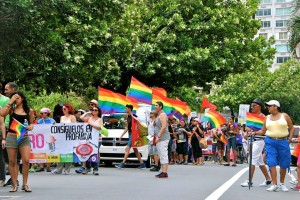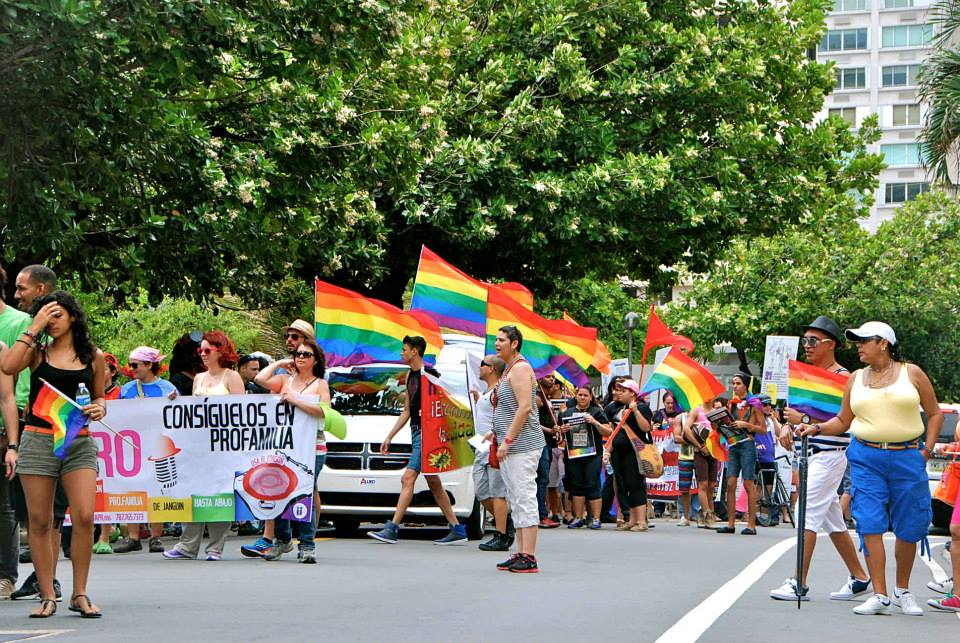 This month Americans are celebrating two historic victories for sexual rights handed down by the Supreme Court: the eradication of the federal Defense of Marriage Act and the weakening of a law that required groups fighting AIDS to make an “antiprostitution pledge.”
This month Americans are celebrating two historic victories for sexual rights handed down by the Supreme Court: the eradication of the federal Defense of Marriage Act and the weakening of a law that required groups fighting AIDS to make an “antiprostitution pledge.”
Defense of Marriage Act (DOMA)
In a 5-4 ruling, the Supreme Court declared that DOMA is unconstitutional. The 1996 law had prevented the federal government from recognizing same-sex marriage, which is currently legal in thirteen states.
“The federal statute is invalid, for no legitimate purpose overcomes the purpose and effect to disparage and to injure those whom the State, by its marriage laws, sought to protect in personhood and dignity,” wrote Justice Anthony Kennedy, on behalf of the court’s majority. “By seeking to displace this protection and treating those persons as living in marriages less respected than others, the federal statute is in violation of the Fifth Amendment.”
Although the court’s decision continues to allow individual states to not recognize same-sex marriages performed elsewhere, it does put an end to same-sex unions being “treated as second-class marriage.” It also forces the federal government to provide the immigration benefits of marriage to same-sex couples, thus helping along congressional negotiations over immigration reform that had stumbled over Republican opposition to extending such benefits in the legislation.
Today is the forty-fourth anniversary of the Stonewall riots, which launched the LGBT rights movement in the United States. The Supreme Court’s decision is another landmark for the movement, and yet it also highlights how much farther the country has to go on the path to full equality. Fifteen countries have passed laws permitting same-sex marriage. A dozen more have such legislation pending. And even in some countries where marriage equality continues to face strong opposition — such as Australia, Ireland, Israel, and Colombia — antidiscrimination laws have already been passed that grant LGBT people the right to civil unions and adoption. As for America? Thirteen states down, thirty-seven to go.
The Antiprostitution Pledge
As part of the President’s Emergency Plan for AIDS Relief (PEPFAR) that Congress enacted in 2003, NGOs that received federal funds to fight AIDS internationally were required to sign a statement publicly opposing sex work. Last week, a 6-2 Supreme Court majority struck down the “antiprostitution pledge,” ruling that it violated the First Amendment.
However, the decision affects only US-based organizations. Foreign NGOs who receive US funding can still be required to make the antiprostitution pledge. “The implication for foreign NGOs remains murky,” Chi Mgbako, a professor at Fordham Law School, told the Nation. “Many current and potential recipients of US global AIDS funding are foreign NGOs.”
The antiprostitution pledge has forced organizations to make a difficult decision: denounce the communities they serve, or lose vital funding for lifesaving HIV/AIDS programs. Increasing condom use among sex workers requires demonstrations of correct use, training on negotiating with clients, and collective action among sex workers — all of which could be considered under the policy as “promoting prostitution.”
On the other hand, publicly opposing sex work makes it harder to establish the trust needed to provide services to hard-to-reach men and women. Sex workers are one of the groups most at risk of HIV infection, and yet stigma and discrimination drive them away from the kinds of health education and services that could lower that risk. “At first when we went to [Lima’s] red-light district, people wouldn’t talk to us,” said a health educator at INPPARES, a group that provides sexual and reproductive health services in Peru (disclosure: INPPARES is a member of the International Planned Parenthood Federation/Western Hemisphere Region, where I work). “They’d grab a bunch of condoms and run away.”
Red-light districts also serve as a safe haven for LGBT individuals, where men and women — especially those from rural areas — can freely express their gender and sexual identities. “Many of the clients we work with live as men in the jungle during the week and as women in Lima on the weekends,” said Dr. Daniel Aspicuelta, the executive director of INPPARES.
By hindering NGOs in their fight against HIV/AIDS, the antiprostitution pledge has endangered the lives of sex workers, their clients, and their families. The Supreme Court’s decision has gutted one part of this misguided policy, but it needs to be fully repealed so that groups like INPPARES can do their job.
This post is based on posts on DOMA and the antiprostitution pledge that appeared in the blog of the International Planned Parenthood Federation/Western Hemisphere Region, where I work.
Update, June 29, 2013: This post was revised for length and clarity, and to add disclosures.
Mandy Van Deven Mandy Van Deven was previously In The Fray’s managing editor. Site: mandyvandeven.com | Twitter: @mandyvandeven
- Follow us on Twitter: @inthefray
- Comment on stories or like us on Facebook
- Subscribe to our free email newsletter
- Send us your writing, photography, or artwork
- Republish our Creative Commons-licensed content

